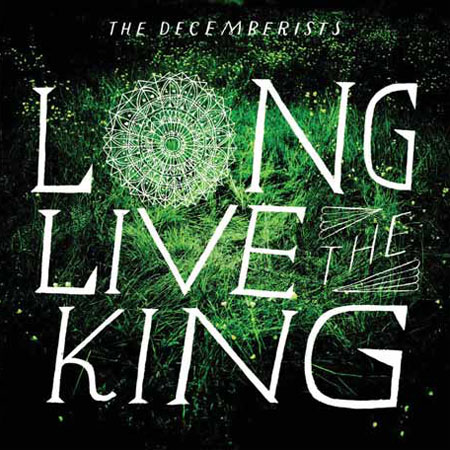The Decemberists have always been a band that knows how to mix the sweet and the sour. For every heartbreaking and introspective tune like “Red Right Ankle” or “Eli, The Barrow Boy,” there are tongue-in-cheek diversions like “The Sporting Life” and “Los Angeles, I’m Yours.” When The Decemberists went their most fully-realized and heavily-criticized with the concept album The Hazards Of Love, their following full-length was their most simple and straight-forward (this year’s The King Is Dead). And, as their 2011 offering was their most commercially successful record to date, even the joy of being a main-stage festival band came with its corollary, as band member Jenny Conley left the band’s tour to treat her breast cancer and frontman Colin Meloy revealed that the band was going to take a long break after this touring cycle ended. So, it is fitting that their last offering for what is presumably a while, the Long Live The King EP, is as much of a mixed-bag as their career and musical tone have been. Unfortunately, this dualism reveals itself in the quality of the product, as Long Live The King feels as unnecessary as any release in recent memory, and proof that sometimes less is more.
In the band’s corner is the fact that Meloy, on his worst day, can write a pleasant melody with seemingly little effort. Even the self-proclaimed “worst song” Meloy has ever written, “Dracula’s Daughter,” is a set regular at Decemberists shows, if only for comic relief. But even with this ease, the six-song collection of cast-asides from The King Is Dead‘s sessions feels tired as a whole, showing nothing new in the band’s bag of tricks and revealing that some of their old tricks may need to be set on the shelf, as well. Opener “E. Watson” shows Meloy at his most narrative, but where his musical tales are normally inviting and playful, there is no opening in “E. Watson” for the listener to enter into its world, and winds up feeling overly didactic. “Row Jimmy,” a Grateful Dead cover that has been readily available as a b-side since last year, feels equally pedantic, seemingly included to show another side to The Decemberists or cast light to a previously unrealized influence. And, well, any connection between The Decemberists and The Grateful Dead, besides an affinity for stretching out a tune, is probably better left undiscovered.
The overarching pointlessness of the collection wears on the listener’s patience to where little faults fester into gaping holes. Why does Meloy stretch his voice in “Sonnet,” which on The King Is Dead sounded better than any other point in his career, to the point where he can’t even hit the notes he loftily attempts? And, on the same song, why does the band save one of the record’s best music moments, a delightful horn interlude, for an afterthought that winds up going nowhere? Most importantly, why do The Decemberists feel the need to revisit a sampling of past sounds (stoner rock on “Burying Davy,” light and effortless pop akin to the Five Songs EP on “Foregone”) without any clasp to hold them together. Nowhere on Long Live The King do any of the songs make cases for themselves to be anything more than b-sides, which at least enforces the decision making process that went in to making the initial, full-length album.
And in the era we live in, where deluxe editions, iTunes bonus tracks, and web exclusives are a commonplace, it shouldn’t be surprising that we see these tunes packaged and sold. Music has become completist vocation, and if a band records and masters something, there is a high likelihood that you will end up hearing it. Sometimes this results in unexpected treats, but Long Live The King is another in many examples of where a band would be just as well leaving some songs unheard. Sure, there is not a bad tune in the bunch, but the problem is that there isn’t a particularly good one here, either, resulting in the feeling that a break for this band may not be the worst thing in the world, as we can hope that they return reinvigorated and inspired.

